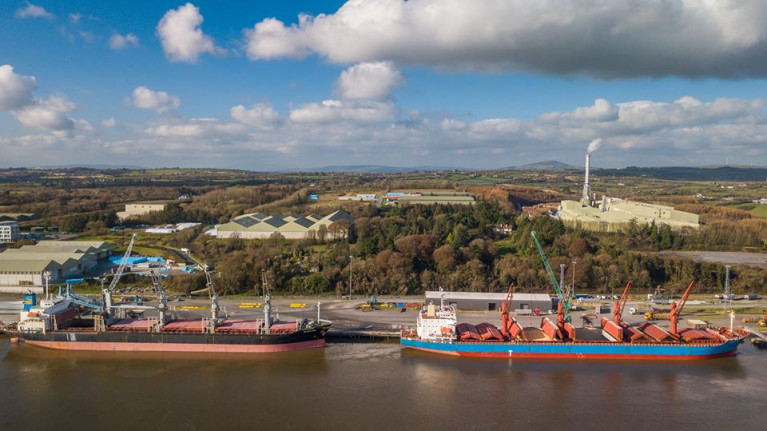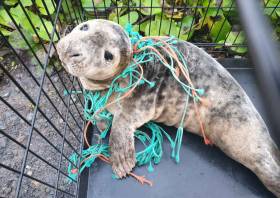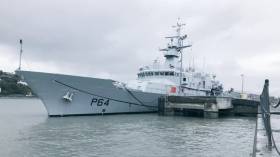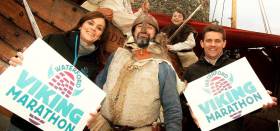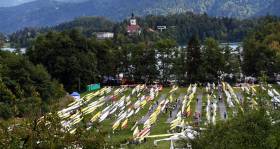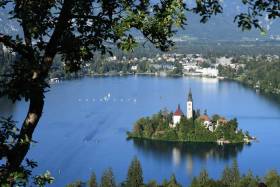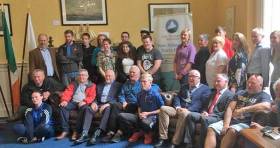Displaying items by tag: Waterford
Schedule of Cruise Calls for Port of Waterford Announced for this Season
Cruise ships visiting the south-east Port of Waterford will total 28 scheduled calls this season, with arrivals to take place in Belview and Dunmore East, which represents a 33% increase on last year.
More than 27,000 cruise-goers this season will add a considerable boost to the local and regional economy, which is estimated at over €2 million.
Afloat highlights that among the cruise ships is Seabourn Ovation (see photo) which is to visit albeit with a single visit in May, when the 604 guest capacity vessel operating at the high-end of the market, is to berth at Belview.
Waterford’s harbour is widely and rightly considered very picturesque and a great place to visit great locations in a compact welcoming region.
Among the highlights are Waterford Crystal, the Mount Congreve Gardens, Waterford’s Copper Coast, the Dunbrody Famine ship (New Ross) and the Hook Lighthouse and the Rock of Cashel.
The team at the Port of Waterford and stakeholders are to attract and manage these cruise calls, and look forward to welcoming visitors to the region during the season, click here for cruise list.
When cruise ships berth at Belview Port, the main terminal for the Port is located 8 kms from Waterford City and is ideally located for excursions to the city and nearby Kilkenny and Wexford.
At the mouth of Waterford estuary is Dunmore East where larger cruise vessels will anchor offshore and operate tenders to the harbour which is managed by Department of Agriculture, Food and the Marine.
The fishing harbour is within easy access to Waterford, city and coast, Kilkenny and beyond.
Long-Abandoned Trawler Removed From Waterford Pier
Waterford’s local authority has removed a long-abandoned trawler that had become a magnet for fly-tipping and vermin at a scenic pier, as the Irish Examiner reports.
The fishing vessel was once part of a fleet of ‘50-footers’ promoted by Bord Iascaigh Mhara and the Irish Sea Fisheries Association up to the 1970s in an effort to revitalise Ireland’s fishing fleet and boost employment in coastal communities.
However, the trawler was left to rot at Tinabinna pier over 20 years ago and with efforts to trace its owner unsuccessful, Waterford City & County Council commissioned its demolition and removal.
The Irish Examiner has more on the story HERE.
Waterford Council Criticised for Use of Bleach to Sanitise Streams Near Dunmore East and Tramore Beaches
Waterford City and County Council has been criticised for its use of bleach to disinfect streams that enter the sea near two popular coastal bathing areas, as TheJournal.ie reports.
The council says it uses sodium hypochlorite to sanitise streams near beaches at Dunmore East and Tramore during the summer bathing season, citing the prevalence of children playing in the waters.
But the chemical compound is considered harmful to flora and fauna by various State agencies, with NGOs like Coastwatch Ireland also expressing their concern.
TheJournal.ie has much more on the story HERE.
As Afloat reported on August 16th, Inland Fisheries Ireland (IFI) says it is investigating the “very concerning” claim.
Operating Profits at Port of Waterford Drop Due to Pandemic
Operating profits at the Port of Waterford for 2020 were €0.7 million, down from the €1.2 million recorded in 2019 during a period of trading set against the pandemic.
The Port's turnover was €7.2m for the year a reduction of 8% against 2019 and shareholder’s funds ended the year at €33m.
Bulk throughput in 2020 came in at 1.5 million tonnes, a 3% decrease on 2019, while the levels of container shipment handled grew by 2%.
The company said that for the first half of 2021, the business is showing very positive momentum despite the continued challenges posed by the pandemic in the ability to drive car park and cruise income.
Bulk handling (see photo) is currently ahead of 2020 by over 20% at this year’s halfway point and container handling is also holding up well and in-line with 2020 levels.
Further reading from RTE News.
Seal Pup Entangled In Netting Is Rescued In Waterford
A seal pup found entangled in fishing netting in Co Waterford yesterday (Wednesday 27 November) is now recovering, as Waterford Live reports.
Nicknamed Pine, the young seal is now in the care of Seal Rescue Ireland in Courtown, Co Wexford after it was rescued by Waterford SPCA from Portally Cove, south-west of Dunmore East.
Keep an eye on the Waterford SPCA Facebook page for more details on his progress.
Waterford welcomes the Naval Service’s newest offshore patrol vessel LÉ George Bernard Shaw for its official naming and commissioning ceremonies today, Tuesday 30 April.
Public viewing of the ceremonies will be from the William Vincent Wallace Plaza in the city centre.
LÉ George Bernard Shaw was delivered from the Babcock Marine Appledore shipyard in Devon to Cork Harbour last October.
It is the fourth and final ship of the P60 class commissioned over recent years, after LÉ William B Yeats, LÉ James Joyce and LÉ Samuel Beckett.
Waterford Viking Marathon To Raise Funds For RNLI
#RNLI - Saturday 30 June has been confirmed as the date for the seventh annual WLRfm Waterford Viking Marathon to raise funds for the RNLI.
The most exciting running event in Waterford, the Viking Marathon following a spectacular route that takes in Waterford City’s Viking Triangle.
Runners will cross both Rice Bridge and the N25 suspension bridge and running along the Waterford Greenway before returning to the state-of-the-art WIT Arena at Carriganore.
Runners can also choose from the full, half or quarter marathon and help raise funds for the RNLI lifeboats, the nominated charity for this year’s event.
Register now on www.waterfordvikingmarathon.com.
The news comes after ‘Lap of the Map’ runner Mary Hickey joined the RNLI to launch its own annual Mayday fundraiser taking place next month, as previously reported on Afloat.ie.
Sweet Win For Irish Composite Eight at World Masters
#Rowing: One of the leading Irish boats at the World Masters Regatta in Bled in Slovenia clocked up a notable win today. The E eight made up of competitors from Belfast Boat Club, Commercial, Neptune and Waterford beat Dynamo of Russia, who have been their constant rivals of recent years. The margin was extremely tight – just .26 of a second.
World Masters Regatta, Bled, Slovenia, Day Four
Men
Eight ‘E’ (Avg 55 or more) – Heat Three: Waterford, Neptune, Commercial, Belfast BC (A Penkert, J Hudson, D Crowley, G Murphy, M Heavey, C Dickson, C Hunter, F O’Toole, D McGuinness) 3:07.88.
Irish Crews Win at World Masters Regatta
#Rowing: Irish composite crews had good wins on the first day of the World Masters Regatta in Bled in Slovenia. The Irish B eight (average age 36 or more), which is formed from six clubs won. Two fours in the E class (average age 55 or more) also won – the Galway/Neptune combination by just .26 of a second. The decision was initially given to their German opponents.
World Masters Regatta, Bled, Slovenia, Day One (Selected Results; Irish interest; all heats of 1,000 metres, winners only)
Men
Eight, B (avg 36 or more) – Heat Five: Galway, Commercial, Shandon, Clonmel, Neptune, Cork 3:05.51.
Four, E (avg 55 or more) – Heat One: Galway, Neptune 3:26.26.
Heat Four: Waterford, Neptune, Commercial, Belfast BC 3:28.1
Sail Training Ireland Presents Awards For Waterford Bursary Voyages
#TallShips - Sail Training Ireland’s 2017 Waterford Bursary Scheme voyages came to a successful conclusion on Friday at a presentation ceremony held in the historic Mayor’s Parlour in Waterford city’s town hall.
Mayor of Waterford City & County Council Pat Nugent presented certificates to the 20 trainees who took part in two week-long sail training voyages.
The Waterford trainees sailed on board local ketch Brian Ború, skippered by owner Tony McLoughlin. After a six-day voyage they sailed into Waterford city to be met by friends, family, and supporters.
The voyage had some challenging sailing conditions that the newly formed crew faced down with growing confidence as they formed a tight knit team who overcame adversity, which is a key part of a good sail training programme.
The happy participants told tales of sightings of dolphins and even a whale, along with monkfish suppers, sing alongs and storytelling. They urged others to get involved in the opportunity of a lifetime.
A note received by Sail Training Ireland from Faye Kennedy who took part really illustrates the essence of the experience:
“Although I am an average 17-year-old teenager from Waterford city, I am different to most, as I have had to deal with a chronic illness. My illness does not define me; however, it does challenge me. Sail Training Ireland has pushed me to overcome the challenges of life at sea. It has also encouraged me to believe in my own potential. I take away a new-found love of sailing with memories of the best week of my life.”
The bursary was established in 2016 in partnership with Port of Waterford, Waterford City and County Council and Waterford Area Partnership, who have generously supported the scheme again this year.
The scheme provides access to the life-changing experience of a sail training voyage for young people from the Waterford region aboard large sailing vessels and tall ships.
A key objective of Sail Training Ireland is to raise financial support to ensure that no young person is excluded from participation due to financial constraints.
The development of Regional Bursary Schemes has proven to be a very successful approach to providing this support.
Daragh Sheridan, chief executive of Sail Training Ireland, also spoke of his “delight at seeing a group of strangers at the beginning of the week becoming great friends by the end of it.”
Sail Training Ireland hopes that with the continued support of the existing supporters and the addition of some new sponsors that the scheme will be expanded next year. Visit
www.sailtrainingireland.com for more information or contact the charity at 01 816 8866 or [email protected].



























